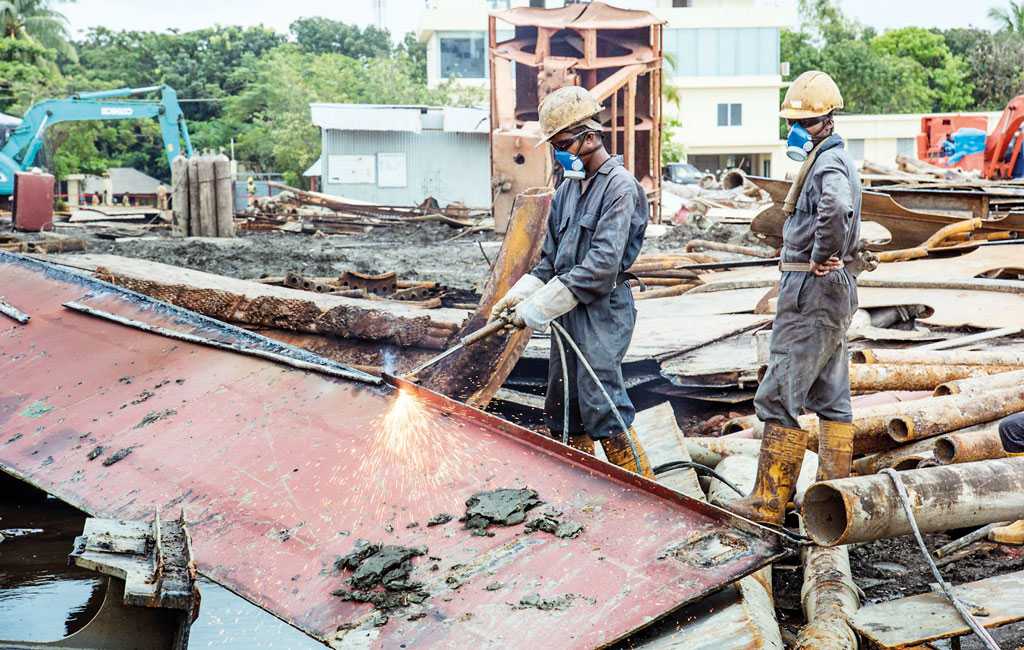Bangladesh secures top position in ship breaking

Image collected
The ship breaking industry of Bangladesh has captured the global market by dismantling around 47.2% world vessels.
A report titled ‘Review of Maritime Transport 2019’ published by United Nations Conference on Trade and Development (UNCTAD) revealed the data on October 30.
Three countries, Bangladesh, India, and Pakistan account for 70–80% of the international recycling market for ocean-going vessels with China and Turkey covering most of the remaining market.
According to the report, in 2018, India dismantled 25.6% ocean-going vessels, Pakistan 21.5%, Turkey 2.3% and China 2%.
In 2018, China, Japan and South Korea were the top most countries in global for ship production, representing together 90% of shipbuilding activities (China 40%, Japan 25% and S. Korea 25%).
The five recycling countries have a large appetite for scrap metal. Bangladesh, Pakistan and to a large extent India uses the steel from recycled ships in mills where steel is rerolled so that it can be used directly in urban construction
As of January 2019, the top five ship-owning economies were Greece, Japan, China, Singapore and Hong Kong.
The bulk material sold for breaking comes from oil tankers, bulk carriers and container ships.
Reasons for securing top position
In 1980, Turkey held the top position in ship breaking while in 1990 it shared the position among China and South Korea. Though India and China held the position for two decades, Bangladesh has grabbed it for the first time.
India and Bangladesh has no iron ore depends on steel for its construction purposes. Also China has stopped importing vessels in effort to reduce pollution giving Bangladesh a way to secure the position for scrapping old vessels. Ship-breaking regulations are also being tightened across the globe.
As per the report, scrapping is a segment of maritime supply chain dominated by developing countries due to several factors, including lower labour costs, a high proportion of utilization of steel from recycled ships for domestic manufacturing and, at times, weak enforcement of regulations.
Moreover, several countries have tightened regulations pertaining to ship demolition. This move is linked to the anticipation of the entry into force of the IMO Hong Kong International Convention for the safe and environmentally sound recycling of ships of 2019, as well as a European Union regulation in force since December 21, 2018.
According to Bangladesh Ship Breakers and Recyclers Association (BSBRA), 221 ships were brought for demolition in 2015, 250 ships in 2016, 214 ships in 2017 and 221 ships in 2018.
Foreign currency
Nazmul Ahsan, assistant secretary of BSBRA said that the ship-breaking sector is saving a huge amount of foreign currency in many ways.
“The industry supplies 60-70% raw materials to the re-rolling mills of the country, generating revenue of Tk 1200-1500 every year,” The vessels plying on the inland routes and the lighter vessels are made of steel dismantled from scrap vessels,” said Nazmul.
Muhammad Ali Shahin, senior program coordinator of Advocacy at Young Power in Social Action (YPSA) told the Dhaka Tribune that the ship breaking yard must ensure occupational safety and see that scrapping does not cause any pollution and health hazards.
Cheap labour
Speaking to the Dhaka Tribune, Tapan Dutta, convener of Ship-breaking Workers’ Trade Union Forum, said that Bangladesh has become a top destination of scrap vessels due to cheap labour and sloppy regulations.
“The dismantling activities will increase further in Bangladesh in the coming days as China and India has minimized the quantity of importing scrap vessels out of environmental concerns.
Ship demolition is a highly risky job but the yard owners hardly follow occupational safety standards and minimum wage board. The ship-breakers are denied of their trade union rights. Impoverished ship breakers take this hazardous job as they have no other options, and yard owners take advantage of the situation. We want a safe environment devoid of any workplace casualty,” said the labour rights activist.
According to BSBRA, out of 160 ship-breaking and recycling yards in Chittagong, only 60-65 are now in operation.
Source: https://www.dhakatribune.com
Tags :
Previous Story
- Participation jumps by 57% at Bangladesh Denim Expo
- Sanwo-Olu draws curtain on 2019 Lagos International Trade...
- Bangladesh Leather Sector Recovers From Two-Year Slump
- Bangladesh booms in a sluggish world economy
- Bangladesh seen as climate threat by boosting coal...
- Trump says he has not consented to move...
- China's Huawei sees 480 million households worldwide with...
- India struggles but Bangladesh's GDP rides high on...